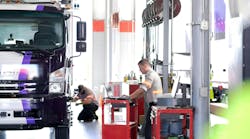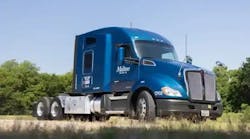The five-year, $4.7 million “Trucking Industry Diesel Study” will involve measuring the amount of diesel exhaust at over 100 trucking terminals nationwide; and then study death certificates of truck drivers, dock workers, and other employees at those terminals who succumb to lung cancer and other respiratory ailments.
The study, headed by Eric Garshick M.D., assistant professor of medicine at Harvard Medical School, will trace the work history of some 55,750 members of the International Brotherhood of Teamsters who are employed by members of the Motor Freight Carriers Assn.
At a press conference last week in Washington, Garshick explained that the study would try to determine the exact amount of diesel exhaust present in the air at different points within the participating terminals. These points include the dock, the exterior terminal yard, inside the warehouse, maintenance shop, truck cabs, etc.
Sophisticated suitcase-sized sampling devices will be placed at different points within the study’s 100 terminals to gather air quality information on a daily basis, and in some cases on an hourly basis. The Teamster participants will also wear Walkman-sized collection devices on their belts to measure the air quality around them.
Yet the study could run into trouble on the human side. It will only look at death certificates over the five-year period – no medical studies will be performed on the survey’s participants to gauge ongoing effects of diesel exhaust.
Also, the study will only look at death certificates from those dying from lung cancer and other respiratory ailments. The study will attempt to gauge the use of cigarettes and other tobacco products by the people involved, but only via medical records.
Garshick admitted that this may limit the scope of what the study can find, but he emphasized that this will be the most in-depth study of the relationship of diesel exhaust to human health factors ever conducted.
Another problem could become evident: Diesel exhaust emissions have been steadily cut over the last two decades. Though the study will attempt to estimate what past exhaust levels might have been like – going back to 1985 – the effort could prove difficult.
Also, future cuts in diesel engine emissions will start in 2006 with the introduction of low-sulfur diesel, followed by stricter engine-emission standards in 2007, so the value of the studies findings once completed could be an issue.


